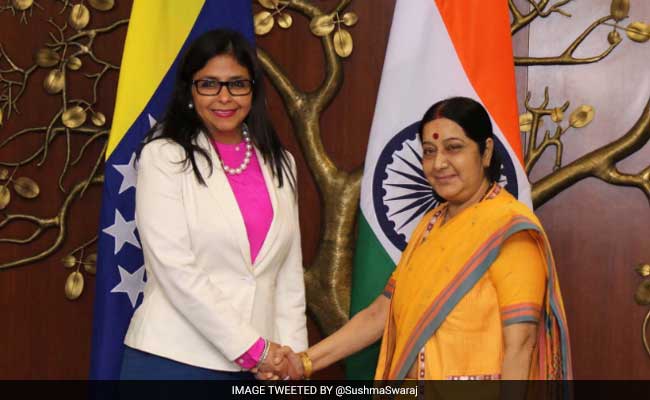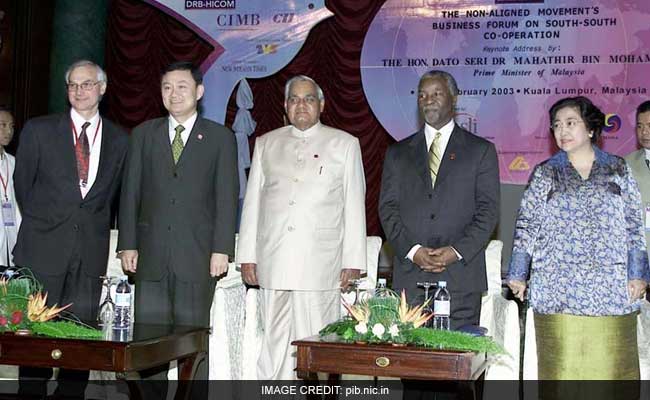"The non-aligned principles are today more relevant than ever," said the Venezuelan Foreign Minister. But the fact of the matter is that the Non Aligned Movement has lost much of its relevance today. It has just become a jamboree of all kinds of nations, aligned, more aligned and most aligned, because it is difficult to identify a country today which is truly non-aligned. But the basic principle of NAM, namely that a country has the fundamental right to autonomously decide its foreign and security policy, still holds good and will always hold good. As one of the founding members of NAM and as one of its leaders, even today, it is India's duty to not only protect and preserve this enduring value of international relations but to raise its voice globally against its erosion by the rich and powerful. Reform of the UN, peace-keeping operations, disarmament and the common economic and other interests of the countries of the South could be exploited to build common platforms on many of these issues in the UN, WTO and global environmental conferences. It is possible therefore to utilize NAM for limited purposes even today.

External Affairs Minister Sushma Swaraj was extended an invitation to attend the Non-Aligned Movement (NAM) Summit by her Venezuelan counterpart Delcy Rodriguez
A NAM summit was held in Kuala Lumpur in Malaysia in February 2003 when I was the External Affairs Minister of India. A meeting of the so-called Zambeli Group in Cape Town preceded the summit. This Group was tasked with the responsibility of finding and identifying issues which would establish the continued relevance of NAM. It was held in Cape Town because South Africa was the chair of NAM then and Malaysia was supposed to take over the chairmanship from it at Kuala Lumpur. So, the presence of Foreign Minsters of these two countries at Cape Town was a given. India, as a founding member of NAM. was naturally a member of this group. Vajpayee was also fully aware of the sentimental value of NAM for many in India. So he asked me to participate in the meeting of the group in Cape Town. Apart from South Africa and Malaysia therefore, I was the only other Foreign Minister attending this meeting. I did not regret doing so either. We played a very important role in Cape Town as well as in Kuala Lumpur. I was asked to prepare the agenda for the summit in the Zambeli Group meeting, which was adopted by the group and subsequently by the whole conference in Kuala Lumpur. Vajpayee attended the summit meeting, met a number of world leaders bilaterally, and established the importance of India in NAM once again. He had attended the earlier meeting also held in Dunbar, South Africa in September 1998.

Then Prime Minister Atal Bihari Vajpayee at the Non-Aligned Movement Summit at Kuala Lumpur, Malaysia in February, 2003
The level of participation by other countries in an important conference also reflects the importance the guest country attaches to the host country. Venezuela is an important country for us in South America. It is not yet a rich country, but it is rich in natural resources. It is also a friendly country to India and the scope for bilateral cooperation is enormous. I am sure other countries will use the opportunity of this meeting to promote their bilateral relations with the host country.
The dates of the NAM summit have been fixed keeping in mind the dates of the annual meeting of the UN General Assembly. Many global leaders would therefore attend the NAM summit in Venezuela and then proceed to New York to attend the UNGA. I understand from newspaper reports that the Prime Minister is perhaps not going to New York this year. I shall strongly recommend that he personally attend both the NAM summit and the UNGA in order to continue the momentum which he has created through his various visits abroad in the last two years.
(Yashwant Sinha is a senior BJP leader and former Union Minister of External Affairs.)
Disclaimer: The opinions expressed within this article are the personal opinions of the author. The facts and opinions appearing in the article do not reflect the views of NDTV and NDTV does not assume any responsibility or liability for the same.


